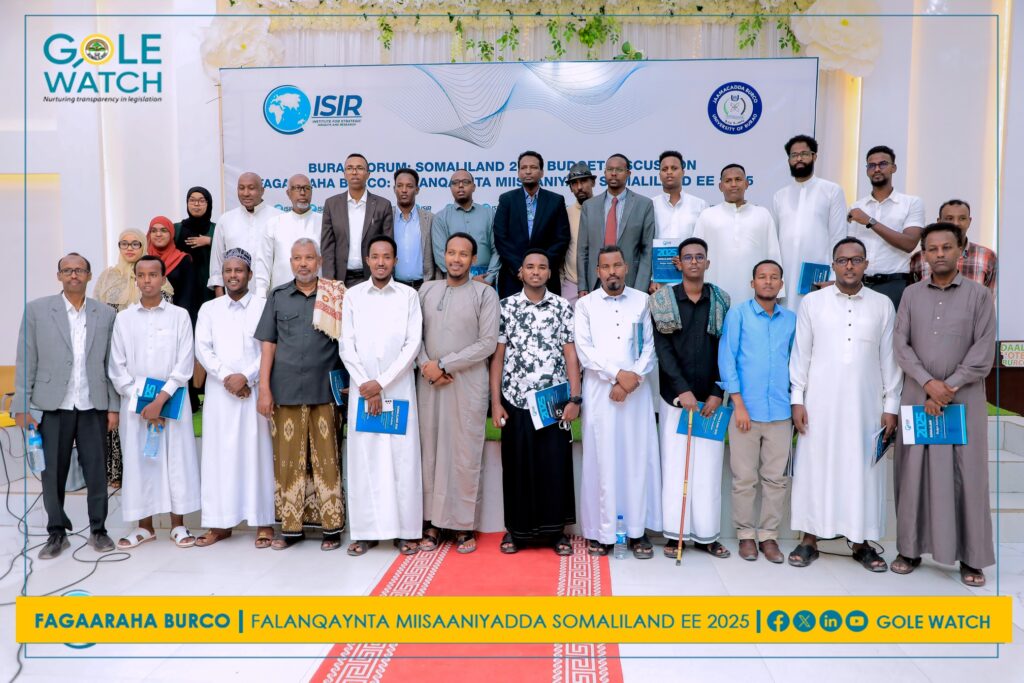Introduction
On April 25, 2024, Burco hosted the NALA Shaah event, where Ahmed Yusuf delivered a compelling presentation titled “Budget Analysis: How Decentralized Is It?” His paper critically analyzed the centralized budget allocation in the region, calling for urgent decentralization to ensure equitable resource distribution. The event attracted scholars, Burco University students, regional government officials, council members, and youth organizations, sparking vibrant discussions on fiscal governance and public involvement.
Key Highlights of the Paper and Discussion
Ahmed Yusuf’s presentation pinpointed several significant challenges in the current budget system:
- Lack of Local Representation: Budget preparation processes often exclude local voices, leading to decisions that do not reflect community needs.
- Inequitable Resource Distribution: Certain regions face disadvantages due to unfair allocation practices, exacerbating disparities.
- Limited Public Awareness: There is a general lack of understanding regarding how budget decisions are made, hindering public engagement.
Following the presentation, a panel discussion expanded on these challenges. Participants emphasized:
- Transparency in Budget Formulation: Advocating for clear and open processes to build trust among citizens.
- Role of Local Councils: Highlighting the importance of councils in voicing community needs.
- Empowerment Through Decentralization: Stressing that decentralization can strengthen regional and district-level governance.
Audience members actively participated, suggesting that public awareness campaigns should accompany budget discussions in the House of Representatives to enhance broader participation.
Immediate Impact of the Paper
The discussions at the event had immediate repercussions:
- May 7, 2024: The regional cabinet convened to discuss budget decentralization, recognizing its significance. A special committee was formed to explore viable decentralization strategies.
- May 14, 2024: The cabinet officially agreed to decentralize the budget, marking a pivotal shift in fiscal policy.
- Government Engagement: The regional government invited Ahmed Yusuf to present his findings on budget gaps, ensuring that policymakers consider these insights in future planning.
- Media Coverage: Caroog TV featured Saleeban Cali Bile, who elaborated on the insights from the paper related to the “U Hiili Burco” program, linking Burco’s economic decline to Act 12, which curtailed the city’s financial influence.
- Economic Updates: The Ministry of Livestock reported record livestock exports of 600,000 million this year, indicating rising prices—a positive development that necessitates equitable budget distribution for sustainable growth.
- Burco Forums (Laas-Geel Institute) are created to initiate discussions on the development of Burco city and to strategize solutions for the socio-economic challenges it faces.
- Togdheer University organized a debate focusing on the socio-economic conditions of Burco and the actions the community should take to encourage the government to decentralize the budget.
Ongoing Reflections and Future Steps
The paper’s influence continues to resonate, showcasing strong public interest in governance matters that impact daily life. Key developments include:
- Increased Civic Engagement: Citizens are increasingly engaged in discussions regarding parliamentary acts and their implications.
- Elite Participation: Intellectuals and professionals in Burco are preparing to actively engage in the 2026 budget process, ensuring that regional needs are prioritized.
- Regional Advocacy: Efforts are being made to secure fair budget allocations for the Toghdheer and Sanaag regions, addressing longstanding disparities.
Conclusion
The NALA Shaah event and Ahmed Yusuf’s paper have sparked a vital conversation about fiscal decentralization in Somaliland. The government’s responsiveness—evident in the formation of committees and the formal approval of decentralization—demonstrates progress. However, ongoing public pressure, media involvement, and institutional reforms will be crucial to achieving transparent, equitable, and participatory budgeting in the future.
The people of Burco and its surrounding regions have made their demands clear: decentralization is not merely a policy issue; it is a call for fairness, representation, and improved livelihoods.


